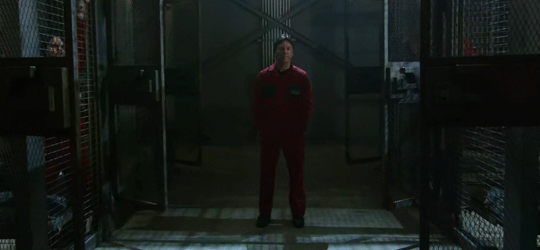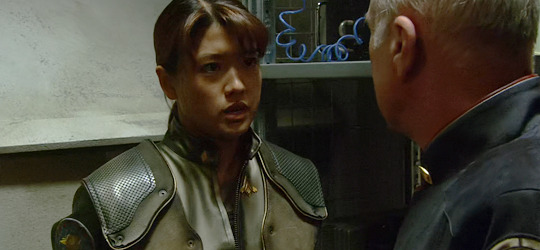#there was actually another adar post i wanted to make but i put it off for to long and now i forgot what I wanted to say
Explore tagged Tumblr posts
Text
"Only blood can bind" and what exactly is the deal with Waldreg?

What the heck is going on in this scene. I was pretty confused the first time I watched it and it felt somewhat out of place, so I rotated it around in my head for few months and wanted to share my thoughts in it now. (this got a little lengthy)
(Also small shootout to @inappropriatemetalfilth because one of their posts, inspired me to write this.) First things first, there were two questions that immediately came to mind when I watched this scene.
What does Adar mean when he says "Only blood can bind" and
Why does Adar pick Rowan out from the crowd to be killed and why is Waldreg the one who should kill him? Why aren't the roles reversed?
The first question is easier to answer now that I had to some times to think about it. Waldreg (the others villagers) are metaphorically binding themselves to Adar and the Uruks or rather: they are entering a sort of "alliance" or rather a treaty with them and they are binding themselves with blood, because they have to kill one of their own. This is also a way for the villagers to proof their worth to Adar's cause and show to what lengths they are willing to go to help him achieve his goals.
This is interesting when you take the later fights between the villagers and the uruks into account. I don't think Adar had the idea, at this point, to dress the deserted villagers as uruks and make them fight their own, but it was a plan he later realized in the show.
He definitely had to make sure the villagers were absolutely loyal to him and willing to harm/ kill their own kind so that I could rely and them shoulder there every be conflict between them and the group who stayed with Arondir/Bronwyn. (There is more to this, but I will get into this later on)
(Also what inappropriatemetalfilth mentioned on their post of Sauron binding Adar to himself, by blood is pretty interesting)

Why is Rowan the victim in the scenario and not Waldreg, wouldn't it make more sense for Adar to get rid of Waldreg? - Was a YouTube comment I read where the person was basically arguing that Rowan would be of more use for Adar because he is young and strong and not and old man unlike Waldreg. This sounded logically for me at the time for some reason
But the things is, I am pretty sure Rowan is a kid. I don't exactly what age Rowan and Theo are supposed to be in the show, but both seem pretty young.

It wouldn't be wise of Adar to pick him as the 'killer' here, because he is so young. Would he be even able to kill someone or be or of good use in Adar's plans, probably not. (Hes just a little guy)
It could also be very well possible that Adar picked Rowan on random or maybe even because he wanted to make it extra hard on Waldreg by having him kill a child, but that is all so speculation.
[Insert a very smooth transition into the part about Waldreg and why he is an important ally to Adar (And actually an important character in general)]
Why did Adar choose Waldreg in this scenario? - Somebody already commented this on another post, but I can't find and I am not sure how many people see it. The object Waldreg is wearing here in this picture (and throughout the entire show)

is called a torc or a torque. A neck ring that identifies its person as a person of high rank. This leads me to believe that Waldreg is the person in charge of Tirharad or has some sort of leader position. This is also indirectly confirmed in the show.
Bronwyn directly heads to his tavern and reports that Hordern had been burned down and his villagers were captured by orcs. She suggests the villagers flee to the Watchtower, but Waldreg shuts her down and nothing comes of it.
Then afterwards, once she returns and slaps the decapitated orc head on his table, he seems to give in an everyone packs their stuff, meaning he does have some sort of authority in Tirharad.
Later one, he is also the one to lead the deserting villagers to meet up with Adar and his uruks.

Once again Waldreg is taking the lead and part of the villagers are willing to follow him and join the orcs. He is also the one, who then speaks up on behalf of the other villager and addresses Adar.

The reason why Adar chooses him to be the one to kill one of his own, is because if he assures himself Waldreg's loyalty, the other villagers will probably follow suit. Waldreg is a way for him to basically control the other villagers so he needs to make sure Waldreg is reliable and willing to go to extremes for him.
Another thing you have to keep in mind, that before the "Only blood can bind" moment, Waldreg had angered Adar by calling him Sauron. - He tried to earn Adar's favour and ended up doing the opposite of that and not only endangered himself but also his people, by antagonizing Adar who has the advantage here.

And then he gives Waldreg practically the tool to redeem himself, and submit to his authority, by telling him to kill Rowan. Waldreg is forced in a position where he has to kill Rowan, to get a on good terms with Adar again and also proof that he and the villagers are of use for the uruks cause/ plans.
And there you have it, my thoughts on these scene and what it actually means for the characters and the show. Thank you for reading this far :)
(I am posting this pretty late, will check for spelling mistakes and stuff tomorrow or when I have time. Please tolerate them in the meantime. Also this:)

#my post#trop#adar#waldreg#rowan#again this is my own interpretation of the events#possible that someone has already pointed this out#or that i missed something#in which case i will self destruct#there was actually another adar post i wanted to make but i put it off for to long and now i forgot what I wanted to say
9 notes
·
View notes
Text
Mulling on this (and apologies in advance if this is incoherent, I am very sleep-deprived at the moment), because it reminds me of some of that post-s1 discourse about whether Galadriel is/isn't done with fighting after giving up her sword.
I don't know how important it is to the writers & showrunners that Galadriel is, fundamentally, right in early s1 about the threat the elves face, because what I've seen them say mainly dwells on 'she messed up'. And she did mess up! But she is also right that Sauron is still out there and right that he is still a threat, and right that the elves should take this far more seriously than they do.
And sometimes it does feel like the narrative is backing her up. She effectively accuses the elves of wanting peace in a way that is itself dangerous: wanting it so badly that they neglect duty and diligence to declare it's peacetime now, war's over, done. And as soon as this order goes to Arondir's company in the Southlands, the elves retreat and immediately Adar and the orcs move in. That's not Galadriel's fault in any arguable sense at all, and it's Galadriel and Arondir (who also didn't leave because he was chasing down something weird going on in another village) who stay to fight in the defence of the Southlanders when the other elves have either gone home or been captured.
Also it would be pleasingly Tolkien-y if they were taking that sort of angle, because this is something that comes out so much more in book LOTR than in the films - the hobbits' peaceful cozy Shire is only that way because it is protected by the Rangers around it, it is surrounded by dangers within and without, and the Hobbits nearly lose it at the end by not noticing that.
BUT ANYWAY I have no idea how much of this they actually are going with. It is however important to me that Galadriel was right about some pretty important things in s1, and it reminds me of all those conversations about whether she'd 'put up her sword' after learning Sauron was Sauron or whether she was still going to be fighting in s2.
I was always on Team 'She's still going to be fighting' because it didn't make much sense to me that her personal journey of "I may have misjudged that one" re: Halbrand should end up in "I should not be fighting my enemies with swords". They are at war; sometimes you do actually need to fight your enemies with swords when you are an elf commander and your people are under attack. And I am glad that is the path the show went down there.
And I do hope they stick to that for her future arc, too - b/c book Galadriel in Lothlorien is not a largely retired benevolent magic woman who is largely sitting out the war, she's more like a general with an active and directing role in what's happening.
And in terms of how well she fits into elf society: I don't feel she should be stifled and shamed and limited in order to do this, but it is kind of difficult to tell how TROP's viewing that. It might be sticking to elf society in a way that's very influenced by the Jackson films aesthetic of "eh idk they all kind of float around in flowy robes and do music and are above anything uncouth or visceral" and by extension the only way she could fit in is to limit herself, restrict herself and lop bits off herself. Sometimes it feels like it is for sure taking that approach and sometimes it feels like for sure isn't, and so I go back and forth on how much I fear what the consequences will be for her as a character in her overall arc.
But again: she was right. Not about everything, sure; and likely Sauron would have spent a bit longer lying low in Númenor without her presence; but in some very big and very important ways she was right, and maybe they need to be more like her in the parts of her personality that allowed her to be.
"Her time with Halbrand was a time where she was very much herself in some ways because she was an Elf alone. She wasn't following the rules of her people at that point. So, he knows a part of her that other people, other beings, don't, and there's a tragedy to losing that, and through losing him, she's also lost that part of herself. " --Morfydd Clark
I thought we were done with LA press day bounties and the latest drop brought the most devastating line yet. 😭 I could go on and on about this aspect of Galadriel's characterization and in particular what being around Halbrand/Sauron brings out of her compared to how she acts when she's back in the 'nest' as it were. I don't know if it's intentional or not but something about the way they've written Galadriel reintegrating back into her community just felt subtly stifling and like that'd be one thing if the writers were self-aware about it but I got the impression it's meant to be this 100% good/wholesome thing about maturation and growth. I think this is the first time someone from the show has spoken of it differently, because there is a Loss there too. A pretty profound one.
Yes she had reasons to feel guilty and that would mean a humbled Galadriel in season 2, but I couldn't help but also notice the way she holds herself, bites her tongue, struggles to contain her anger and pain, are all pretty similar to how she acted around the elves in season 1 before she was exiled. And we subsequently saw her really sparking and expressing everything she felt after jumping off that ship, meeting Halbrand, causing a ruckus on Numenor, etc etc. (With Habrand especially, I think the way I described it once when watching s1, the reason the dynamic really grabbed me and what I saw as Galadriel coming alive, is that he spoke to her like she was just a woman, the real flesh and blood person in between the black sheep of the elves or the untouchable Lady of Light. It's no wonder he got her to bare her soul in that forge.) I reject the idea that all of that was just this flawed part of her she needs to erase from her character to become the true Galadriel. Character growth should temper her more impulsive and reckless traits but not figuratively lobotomize her.
78 notes
·
View notes
Text
Purim 2021
There are lots of different ways to “read” the Megillah.
The simplest, I suppose, would be to take it at face value as an historical account of the series of events that led to Purim becoming a universally observed Jewish holiday. Reading it this way would suppose that the personalities mentioned—and not just the major ones but even the minor characters who appear just once or twice in the story—were all real people and that they all played the specific roles the story assigns to them in the drama. This approach founders a bit on the fact that there are no traces of any of them other than King Achashveirosh (assuming he is correctly to be identified with Xerxes I) in any extra-biblical document, including any of the fairly voluminous works that chronicle Persian history during the period the story appears to be set. (For an excellent essay by Mitchell First on the question of whether Achashveirosh can reasonably be identified as Xerxes I, click here.) Still, that’s hardly proof-positive that none of them existed: lots of real people don’t make it into the history books! (But how many queens are in that category? Maybe that’s the more pertinent question to ask!)
Fortunately, there is no lack of alternate approaches.
Focusing on Queen Vashti’s principled refusal to degrade herself in public merely because her husband ordered her to and also on Queen Esther’s willingness to risk her own life for the sake of saving her people, it would be easy to read the Megillah as a feminist story intended to remind its audience that women—for all they are so often overlooked in ancient works of history—could and did play important roles at crucial junctures. But the Megillah could also be read as a work of proto-Zionism, one intended to drive home the point that, even in the very best of times, Jews living outside Israel are subject to the arbitrary anti-Semitism both of petulant foes like Haman and of naïve enablers like King Achashveirosh. And the book could also easily be read as a critique of the whole monarchic system of governance, one in which a drunken dunce like Achashverosh can be manipulated easily by wily advisers like Haman who are pursuing deeply personal agendas.
All of the above would be interesting to explore in more depth, but I would like to use this space this week to write about yet another approach to the Megillah, one inspired partially by last month’s assault on the Capitol and partially by the sense, dramatically heightened by those events, that there are elements out here whom we don’t know and haven’t ever met…but who nonetheless wish us harm.
As all regular reader of Megillat Esther know, the ninth chapter is the big one, the chapter in which all plot lines converge to produce a satisfying dénouement fully worthy of annual celebration. Indeed, it is the only chapter that actually takes place during the month of Adar, the month of Purim. (Almost all the action up to that point—including Haman’s casting of lots, King Achashveirosh’s order that Haman parade Mordecai through the streets to honor him for his good deed, both of the banquets that Esther prepares for Haman and Mordechai, and the fabulous scene in which Haman flings himself as Esther’s feet and knocks her over just as King Achashveirosh comes back into the room, only to end up sentenced to death and finally impaled on the execution post he had had prepared for Mordechai—all of that takes place almost a full year earlier during the previous Pesach. Then came the wrangling over how to stop the pogrom that led to an official edict promulgated on 23 Sivan, exactly two months later, that granted the Jews permission to defend themselves against their enemies.) And now, as chapter nine begins, almost a full year has passed and the big day is finally here.
That ninth chapter is one we all read far too quickly through, and particularly if we want to read it the way I would like to propose today. But let’s start with that edict of 23 Sivan, the one executed in the first places because King Achashveirosh, the supreme ruler of an entire empire, lacked the legal authority to rescind one of his own edicts merely because the original copy was stamped with the mark of his signet ring. The whole idea that an absolute monarch can’t countermand one of his own edicts is idiotic and, indeed, the notion that an edict promulgated in the king’s name and sealed with his seal cannot be withdrawn is not known from any other Persian documents from the era. (It also directly contradicts the passage at the end of chapter one that says that the specific way to make an edict not rescindable is for it formally to be “written up among the laws of the Persians and the Medes.”) So we’re being challenged to read with our eyes wide open. And what the new edict says is, to say the least, startling. First, there is to be defense:
Jewish men in every city of the kingdom are formally granted permission to organize local militias with the express purpose of defending the Jewish population by endeavoring to destroy, exterminate, and annihilate the thugs of every people and ethnicity who were planning such ill for them, their children and their wives, and then by plundering all their foes’ possessions.
And then there is to be offense as well:
Over and above the right to defend themselves, the Jews in every province over which King Achashveirosh rules are also to be permitted, albeit only on one single day, to wit the thirteenth day of the twelfth month called Adar, to advance forcefully against their enemies and to seek revenge for the degree to which these foes had embraced the awful plot hatched against the Jews by wicked Haman.
So that’s pretty clear. And what happens the next spring is precisely what the text says will happen. On the thirteenth of Adar, the day Haman had planned to annihilate the Jews of Persia, the Jews rise up against their enemies. In Shushan alone, five hundred foes are killed. Then, after receiving royal dispensation to keep at it for one extra day, another three hundred are killed. In the rest of the empire, things go just as swimmingly: on the thirteenth day of Adar alone, a full 75,000 are killed, bringing the two-day total to 75,800 dead sonim. We are clearly meant to understand that there are no Jewish losses at all. Nor was this at all unexpected: at the end of the previous chapter, the Megillah notes that there was such anxiety afoot among those who had planned to attack the Jews that some pathetically attempted to disguise themselves as Jews so as not to be subject to their would-be victims’ wrath.
And now we get to the question that will challenge thoughtful readers. The enemy is completely demoralized, the fight clearly completely out of them. They don’t put up any resistance; the major plot detail that the permission granted them to go on the attack and to attempt to annihilate the Jewish population has not been withdrawn seems totally to be forgotten. Like most bullies, I suppose, they fold easily when facing real opposition. And this appears to have been the case despite the fact that the Jews were surely a tiny minority group in an enormous sea of Gentiles. Surely, they could have taken the Jews on even despite the permission granted the latter to fight back…or at least they could have tried. But they seem to have totally forgotten about their might, about the potential in their numbers, and about the full legality of their pending Aktion against the Jewish population. It feels, at least plausibly, that there is no real danger to the Jews of the realm on that fateful day: they go on the offensive and annihilate foes fully cowed into submission by the mere possibility of their would-be victims fighting back. How else could there have been no Jewish casualties at all?
And so we come to pathetic truth behind the narrative. The Jews could have defended themselves anyway. (Why couldn’t they have? Was fighting off your would-be murderer illegal in Old Persia?) The mob of anti-Semites retains its right to go on the offensive. So, really, nothing has changed at all. Except—this is the pathetic part—that a Gentile king (and, at that, a drunken oaf like Achashveirosh) told the Jews they could stand up for themselves. Which they could have anyway…but didn’t. Or wouldn’t have. Until someone formally gave them permission.
We feel safe, we American Jews. We trust the police, have faith in our government, feel secure enough (most of the time) to look past the occasional anti-Semitic remark by a member of Congress. We buy homes with twenty- or thirty-year mortgages because we expect to be living in them decades in the future. And we haven’t fled to Israel for the same reason. I know all the above because I feel that way myself! And then suddenly there are organized anti-Semites marching through the streets of downtown Charlottesville. A comedian we all thought of as super-hip and wholly benign tells an overtly anti-Semitic joke on television and only we seem to notice. The Capitol is overrun by insurrectionists, some of whom are openly displaying anti-Semitic slogans and symbols…and no one seems quite sure what to do about it. Are racist slogans on t-shirts protected by the First Amendment? Suddenly, the answer to that question seems to determine whom you ask for an answer.
The Megillah could not be clearer in its message that it is neither cogent nor effective solely to respond to anti-Semitism by reacting to it ex post facto. The Bible’s solution—that we go on the attack and annihilate our would-be annihilators before they have a chance to do the same to us—is obviously not something any normal citizen, Jewish or not, would countenance. But the lessons the Megillah teaches in this regards remains pertinent and timely. No one needs permission to stand up for his or her rights. The pathetic image of Persian Jewry finding the strength to oppose its own annihilation only when the government formally permits them to do so is meant to be both embarrassing and chastening. Helping bigots to divest themselves of their bigotry before anyone gets hurt is an excellent plan. But the Megillah teaches that that can only be undertaken successfully by people possessed of confidence, self-reliance, and unwavering certainty in their own right to exist and to flourish.
0 notes
Text
Kelis Says Pharrell Williams ‘Stole Her Publishing’ - ‘I Don’t Feel Like Protecting The Sanctity Of The Black Man Any More’

It’s 2020 and Kelis is no longer protecting black men. She has revealed producer Pharrell Williams stole her publishing from her first two albums. When she approached him about it, he basically blamed her for signing the contract. She also gives an update on her co-parenting relationship with her ex-husband Nas. Get it all inside…
Caught Out There!
For the most part, black women have defended and protected black men as it has been preached to us since we were young. Racial solidarity is definitely a “thing” and it’s taught early.
Black women and girls are pressured to keep their mouths shut to protect black men who violate us and to also step up to the plate to defend black men who have been wronged, i.e. Gabrielle Union supported Terry Crews when he made sexual assault allegations only for him to act obtuse when she spoke out about the "toxic" and "racially insensitive" work environment behind-the-scenes at “AGT.” His defense was he never experienced any racism or sexism on the show. However, he didn’t have to experience it to simply have her back like she did for him when he was battling against critics of his sexual assault claims.
Well, it seems black women are catching on and are speaking out about the alleged abuse and violations at the hands of black men.
Singer Kelis is at a place in her life where she no longer feels the need to “protect” black men at her own expense. And she’s sharing her story, unfiltered, regardless of how men who have wronged her feel.
These days, the trained chef is taking care of her farm that’s two and a half hours outside of LA, deep in wine country, with her photographer husband Mike Mora. They live on the farm with their four-year-old son Shepherd and Kelis’ 10-year-old son Knight, whom she shares with rapper Nas. Sounds kinda dreamy, actually.
It’s the 20th anniversary of her debut album Kaleidoscope, so she’s gearing up for a mini tour to celebrate.
Reflecting on her debut album brought back some bitter memories. The 40-year-old singer-turned-chef shared how her friendship with the Neptunes – Pharrell Williams & Chad Hugo – crumbled over money.
“I thought it was a beautiful and pure, creative safe space,” she said in an interview with The Guardian. “But it ended up not being that at all.”
Kelis’ story about being an aspiring artist signing a shady contract is something we’ve all heard about the music industry over the years. However, this story hit different for her because it was “friends” who ripped her off.
“I was told we were going to split the whole thing 33/33/33, which we didn’t do,” she explained.
She said she was “blatantly lied to and tricked,” pointing specifically to “the Neptunes and their management and their lawyers and all that stuff.”
Her first two albums – Kaleidoscope (Dec. ’99) & Wanderland (Oct. ‘01) – were produced by the Neptunes. She alleged she didn’t make a dime for her album sales because she was making money from touring “and just the fact that I wasn’t poor felt like enough,” but she eventually smartened up and realized she was NOT receiving her coins.
“Their argument is: ‘Well, you signed it.’ I’m like: ‘Yeah, I signed what I was told, and I was too young and too stupid to double-check it.’”
Def heard this before. It’s a common theme in the music industry about young, black entertainers signing contracts without having their own legal council to look it over. By the way, The Guardian said they reached out to Pharrell & Chad, but they did not respond to repeated requests for comment.
When it was time to work on their third album Tasty, she decided to work with different producers and she said she could tell the Neptunes “were really offended.” After that, they were no longer friends. However, Kelis said she’s not angry about the situation, she’s simply “stating the facts.”
“To be honest with you, I think if it were not for my faith, I feel like that would probably be the case. It’s very clear to me, especially being on a farm, that whatever you put in the ground, that is what’s going to come back to you,” she said.
A few years ago, Pharrell was performing at an industry event where she was seated in the audience and she shared their interaction.
“And he did that thing to me that he’s notorious for, which is making a nod from the stage [to someone in the audience], so it seems like there’s mutual respect, when in reality …” She throws her head back and laughs. “I’m like, OK, I’m not going to yell back: ‘You stole all my publishing!’ So you end up nodding back and everyone thinks everything’s great. Like, whatever.”
When asked if she would ever work with P again, she said, “Ummm, at that point there’s having faith and there is also just stupidity.”
Can’t blame her there.
This revelation comes after Kelis revealed in 2018 her ex-husband/rapper Nas (whom she married in 2005) allegedly physically abused her throughout their relationship - something he vehemently denies.
She left Nas while seven months pregnant and she credited the Rihanna/Chris Brown 2009 assault as the driving force that helped her make that decision – “It woke me up.” After she found out she was pregnant, she knew she couldn’t bring another person into the madness, so she dipped for good.
After all that she has gone through, she’s no longer staying silent.
“Well, I’m a very private person, and whether it’s the stuff with the Neptunes and being assaulted from a business perspective, to then being assaulted in the home, I fought so hard to have my own voice, even with the umbrella of these men looming over what I was trying to do. I’m not broken. But I don’t feel like protecting the sanctity of the black man any more,” she shared.
After Kelis made the allegations, Nas denied ever assaulting her and accused her of not letting him see his son.
“Any rational person would look at this situation and say [to Nas]: ‘Well, if you want to see [your child], you have to actually show up!’ My kid is a really happy child, because I don’t tell him when [his father] says he’s going to come and doesn’t show up.”
So, it seems she and Nas still have a strained co-parenting relationship.
Kelis also opened up about racism in the industry:
"The issue of race has been such a big part of my entire career. It was never something that I struggled with personally. But it was other people’s confusions. Macy Gray and I were the first [black women] to be considered alternative. But people were like: ‘But you’re black and alternative? What is that?’ Which already is a stupid-ass question, but it was put in our faces all the time,” she explained.
No surprise there.
View this post on Instagram
It's the 20 year anniversary of my first album Kaleidoscope! Hitting the road in Europe to celebrate Tickets on sale Friday at 10am CET.
A post shared by Kelis (@kelis) on Nov 18, 2019 at 1:05am PST
On the bright side, Kelis will leave her farm to kick off “The Kaleidoscope Tour” on March 3rd in Europe. She'll wrap up in London on March 17th.
Photos: Everett Collection/ Ron Adar/Shutterstock.com
[Read More ...] source http://theybf.com/2020/01/31/kelis-says-pharrell-williams-%E2%80%98stole-all-her-publishing%E2%80%99-%E2%80%98i-don%E2%80%99t-feel-like-protecting-the
1 note
·
View note
Text
Bastille Day, A Reactionary Post
Battlestar Galactica S.1 E.3, Episode Review

Tigh as a functioning alcoholic The episode opens up with Tigh starting off his day with a couple of shots. And just how easily it is for him to function on a normal level with that alcohol running through his veins.
It's interesting to note that despite finding water in Water they are down again or hadn't found enough water. This is a nice and wonderful contrast to a little known sci-fi show that RDM previously worked on called Star Trek Voyager. In which they never ran out of torpedos, food, water and had a endless supply of scuttle crafts. Just ask Chakotay about that last one.
Solving the water crisis...with criminals I love Laura here. She takes charge here as President. There still is a power struggle here between her and Bill. And she doesn't back down, nor does she defer to him here. Even though things are better between them and they have started to bond and find some common interests. It is vitally important for her to maintain power. That she can and will.

Also her response to Billy suggesting Anastasia go with the crew to the prison ship. Mary McDonnell is a master in reactions. Later her teasing Billy is just too adorable.
Laura's hair

Looks like they are still trying to figure out a good hairstyle for Laura. It's better than the mini but looks very farrah fawcett circa 1970's. Not my favorite style for Laura. That'd be season 2 "Laura is dying so she doesn't give too much attention to her hair" so it looks pretty natural.
Choosing sides: Lee, who do you want to be? A Battlestar Commander like Daddy or the President like Mommy?
Lee is a young man who really doesn't know what he wants to do. He has a strong set of morals but I think at this point he doesn't really know who he is. And here he finds himself torn between his father and Laura.

Honestly I'm not quite sure why Bill has such a big bug up his ass about Lee being Laura's representative. Maybe it's a bit of Bill not wanting to lose Lee to politics. Despite having both of his sons follow him into the service, one is dead and the other one seems to be contemplating what he wants out of life. And that just may not be a commander on the battlestar.
Although maybe Bill's point of choosing sides may have to be that Lee will have to pick on whether he wants to be a pilot or a politician. He can't be both. Which of course I agree with Bill on that he can't. But for now Lee will do a bit of both before he has to ultimately decide on who he wants to be.
"If they volunteer but these men are not slaves and I will not have them treated as such."
Also knowing what I now know about Lee. It’s not hard to see Lee being swayed by Laura. She’s very much for democratic rights at this stage in the show and that’s something that’s very much at the core of what makes Lee tick. So she’s someone for him to look up to verses his father’s rigid stance on democracy (he really doesn’t believe in it) especially when he lives in world where taking and giving orders is life. In that world there is no room for democracy.
I am Tom Zarek and today is the first day of the new era I remember when I was first watched the show last year. There was such a big deal with Zarek's introduction scene that I knew he had to be someone but he wasn't any kind of actor that I had recognized. If you had watched the original BSG then you'd recognize him as the original Apollo.
Apollo verse Apollo

I could never get a handle on what exactly Zarek wanted. Here he pumps Lee for information on any weaknesses between Roslin and Adama. He appeals to Lee's strong morals to sway him towards his agenda. I suppose my assumption would be that Zarek wants power and to gain control of the fleet. Although why, I'm not exactly sure. To have power? Because he's power hungry?
The thing about Zarek is that he always brings up some really great points about the current political situations whenever he pops up. He's got a point that Laura was never elected and that there should be elections. However, he's waaaay over dramatic about it and he is completely wrong that her presidency is illegitimate. Laura's assent into the presidency was in fact legal with her being the next in line for the presidency and there for legitimate.
The thing about Zarek is his way of going about things to prove his point. He more often than not uses violence to force change and for what reason? For Power?
Boomer and the Chief: a forbidden love story
It's only obvious to everyone that Boomer and the chief are hitting the sheets or rather hitting the deck plates. Their illicit affair is having consequences.

“Your his superior officer, we're at war this is a combat unit and your his superior officer. Put a stop to it. That's an order."
Tigh is finally putting his foot down and as we later learn Adama knew about their affair and let it go on. Another way that Tigh and Adama differ. Tigh doesn't let anyone get away with their shit. Adama is a softie at heart and really just wants people to be happy. And if that means giving them more room to do their thing than they should then so be it. Also the Irony of what is being said here to what happens in season 4.
Caprica City, Caprica I have to wonder if Caprica is so yellow due to the radiation from the bombings or is Caprica naturally that bright and yellow.
“He's your son.” “He's your advisor.”

Mom and Dad fighting over their kid already. You send the kid in to deal with the situation and what does he come back with? Not the solution that you had in mind. Much like a later episode (which is considered the worst episode of BSG, and you know what I'm talking about) Lee's solution to the problem is not to actually resolve the problem. Instead of dealing with the prisoners he decides oh. Let's let them go and be free men. Even if none of them have earned it. Even if some (lets face it probably all) of them are dangerous.
Lee's compromise is that they are dependent on the rest of the fleet for food and fuel. Yes that's true but what's stopping them from hijacking a transport to their ship and wreaking having on the rest of the fleet. Nothing.
I will give him that yes, I agree. They should eventually have an election once the remainder of Adar's term is up. But on the downside of this...actions have consequences and the result of Lee's actions means that ultimately Gaius Baltar becomes president. And in a strange twist of fate New Caprica and this shit that happened there is precipitated by Lee.
Kara and Tigh and the water that was not booze. I love Kara here and her little fake out. By giving Tigh water out of a flask and everyone (including Tigh) thinking that it's booze. This is really Kara's way of coming to common ground with him. Not necessarily resolving their issues but at least they are in a better place than before.
Laura and Lee,
“The truth is I have cancer.” “I’m going to fight this but there is a great need for secrecy. Whether or not I survive this illness it is a great importance to me that there is a future for the people. And I fear that knowledge of my illness will erode hope. So this has to stay between you and me.” - Laura
“You can count on me.” - Lee
irony...oh Lee.
Love that dialog "Stay Frosty, there Billy." I feel like that was a saying back in the day. Stay frosty. I love it even if I don't know what it means. Stay cool maybe? Don't let shit get to your head?
"Where's your mommy?" - Saul "Dead. Where's yours?" - Useless kid who I forget his name, oh yeah it’s Boxey. What the hell kind of name is that!?

- I swear this kid is so useless except for giving awesome one liners and thank goodness he's gone from the show after this episode.
"Zeus is calling." The first time that Adama is called Zeus, god of Olympus and god of the gods. A pretty fitting title since this show loves mythology and religious references. Adama is the father of humanity (Olympus) and father to those under his command (god of the gods). And the man with (along with Laura) holds the power.
The Sad Bill segment

why so sad?
What I liked about this episode? I was never the biggest fan of Apollo's character but after seeing the whole entire series. I do think I like this episode better than the first time I saw it. We also get introduced to a wonderfully slippery Zarek. Who we always know has nefarious motivations but does bring up excellent points. He's power hungry and able to read people.
What I didn't like about this episode? Wasn't much that I didn't like except maybe the focus on a character that I don't care for all that much. Meaning whiny Lee.
#bsg a reactionary post#bsg season 1 a reactionary post#bsg#battlestar galactica#lee adama#boomer and the chief#Bastille Day#saul tigh#laura roslin#bill adama#tom zarek
24 notes
·
View notes
Text
Maybe the Torah's Calendar was never a Lunar or Lunisolar Calendar?
First some terminology clarification. The traditional Rabbinic Hebrew Calendar we're used to calling a Lunar Calendar is strictly speaking a Lunisolar Calendar, the phases of the Moon come first but synchronization is done with a Solar year so the seasons don't get out of wack. The same is true of the popular variants I've discussed already like the Samaritan Calendar, the Kariate reckoning and the proposed Lunar Sabbath model. A strictly Lunar Calendar would be something like the Islamic Calendar which makes no attempt to reconcile and so Ramadan has fallen al over the Gregorian Calendar. But I've lately been questioning this traditional assumption that the Torah's Calendar is Lunar. Let's start with the fact that the Torah has completely different words for Month and Moon, that is not what I'd expect from a strictly Lunar month based culture. Month is Chodesh/Hodesh (Strongs Number 2320) while Moon is Jerah/Yerach (3394). There are a few places where the latter word is used of a passage of time, but that's because even without a lunar calendar the concept of a month is still tied poetically to the Moon somewhat as it's phases come close at least. The phrase "Rosh Chodesh" gets translated "New Moon" sometimes because of our traditional assumptions, but Rosh means the beginning or head of something. The Torah never talks about the Full Moon, even in regards to the Holy Days that should happen then on a Lunar or Lunisolar calendar. Two verses elsewhere in the Hebrew Bible are often translated as referring to the Full Moon, but those are highly disputable as I've discussed before. Colossians 2:16 is the one New Testament reference to the Jewish concept of the "Rosh Chodesh", and it again uses a Greek word for Month, not Selene the word for the Moon. And then there is all the evidence that The Bible clearly thinks of a Month as being 30 days not 29 and a half. It's there when you do the math of the Flood chronology of Genesis 7 and 8 with 5 months being exactly 150 days beginning on the 17th of the eight month and ending on the 17th of the seventh month. And it's also in Daniel and Revelation with 42 Months, 1,260 days and three and a half years being treated as synonymous time periods, and then in Daniel 12 1,290 days being that with one more month added, and 1,335 days added another month and a half. However there is one thing often taken as evidence for a 365 day year in the Torah, and that is how that number happens to be the number of years Enoch lived. But that could be a coincidence. Genesis 1:14-19 discuses the Sun (greater light), Moon (lesser light) and stars being made for signs and for seasons and for days and for years. But you'll notice in verse 16 the Sun is made and talked about first, it has priority. And months are seemingly missing from the discussion. It is well known that the Hebrew Calendar was influenced by the Babylonian Calendar during the Captivity, the names we're now used to calling the months come from Babylon for one thing. Well the thing is Babylon had a Lunisolar Calendar, so even that aspect of it could be Babylonian in origin. Lunar Calendars were more popular with the ancient Pagans then you might expect given the modern popular narrative that Paganism always revolved around Sun worship. But in fact the most prominent not at all Lunar Calendar used by Pagans in classical antiquity was the Civil Egyptian calendar, but even they originally had a Lunar one which they kept for ceremonial purposes. Actually even in Greece the Attic Lunar Calender's main purpose was for how they observed Pagan festivals. Now as much as we love to see all things Egyptian as bad, it wasn't the Egyptians much of the Torah is telling the Israelite not to be like, it was the Canaanites. One of the Canaanite tribes was the Amorites, Babylon first became a major player in Mesopotamia under it's Amorite dynasty, so that Babylonian calendar could be Canaanite in origin. There is one indisputable difference between the Torah Calendar and the Civil Egyptian Calendar, and that is when to start it. Exodus 12 proclaims Aviv (the time of the Barley Harvest, early Spring) to be the first month while the Egyptian Calendar starts near the Autumnal Equinox. It is a common traditional conjecture that before Exodus 12 the first season was Fall rather then Spring, and that in Exodus 12 YHWH is swapping the First and Seventh months. I'd been thinking of making a post on how we can't prove that using Scripture alone. But since they were in Egypt for several generations it's very possible the Egyptian Calendar was their starting point and what month to make the first month was the only change YHWH is making in Exodus 12. Though different agricultural and climate circumstances in Canaan no doubt brought further differences, the Egyptian Calender was organized around 3 seasons rather then 4 because of how they were ruled by the flooding of the Nile. In a hypothetical Torah based Solar Calendar the Intercalary month of five or sixth days (if that was the method used for synchronization) would go between Adar and Nisan rather then in September. (BTW, those 5 days were when the Egyptians observed the birthdays of Osiris and Horus, not anywhere near Christmas. And the Egyptian new year was September 11th on our calendar coincidentally enough.) Or maybe you would try to put them before the Seventh Month to keep Yom Teruah aligned with the Spring Equinox. Since I view the Trumpet of Yom Teruah as also the Last Trump of Revelation 11, could it be preceding 6 Trumpets were meant to be associated with the proceeding extra days? Genesis 1:14 is possibly using Signs in place of Months, I have over the years gone back and forth on the Mazzaroth/Gospel in the Stars theory. Maybe fellow Mazzaroth proponents like Rob Skiba should consider that the Star Signs can be an alternate to the Moon for how to determine the months of the year. Josephus did refer to Nisan as being when the Sun is in Aries, in the first century the Sun entered Aries around the Spring Equinox, and that month is indeed when the Barley Harvest happens. The Romans had a Seven Day Barley Festival similar to Unleavened Bread that was the 12-18th of April, but due to the awkwardness of Caesar's revisions that may be off form when in the Sun's journey it was supposed to be. It is popular to theorize that Revelation 12:1 is describing some astronomical alignment involving the Moon. If it is it could be an exception and not proof the months are usually defined by the Moon. But I'm skeptical of that altogether, I think it's probably a purely supernatural vision and not something predictable using Stelarrium. Now I do believe the Passover through Pentecost of Christ's Passion, Resurrection and sending of the Holy Spirit was based on what the Jews of the time were doing regardless of if it was still accurate. But it may be it happened to be a year when they did line up, or at least close enough that First Fruits was the right Sunday. Since I favor 30 AD and a Thursday Crucifixion on the 14th of Nisan followed by a Sunday Resurrection on the 17th of Nisan, I have long placed the Passion on the 6th of April 30 AD. The Qumran Community who wrote the Dead Sea Scrolls also rejected the Lunar Calendar, the Temple Scroll is our main source on their Calendar but it's discussed in other scrolls too. I don't think that Calendar is right either, like the Lunar Sabbath model it wants to synchronize the monthly and yearly cycle to the weekly cycle by giving every 3rd month and extra day creating a 364 day year. As I've talked about before the language in Leviticus 23 about Firs Fruits and Pentecost is clearly assuming they won't line up. They make the first day of the year a Wednesday because that was the day the Sun and Moon were created. But at least they correctly placed First Fruits and Pentecost on Sundays. Weeks are not even remotely mentioned in the Genesis 1 account of the fourth day, so they aren't connected to the sun, moon or stars. The Book of Jubilees was popular with them because it too rejected the Lunar Calendar (Chapter 6 verses 32-37). Something I bet Rob Skiba didn't notice when using the book for his agendas (The Jubilees Calendar also seems to be endorsed by Enoch 72-82). But indeed Jubilees has the same problem as the Temple Scroll system. In fact it's criticism of the lunar system for it doesn't line up perfectly with the seasons is hypocritical when their being one day short of a solar year will inevitably create the same issue. The Hebrew Roots movement has a lot of irrational fear of Sun Worship wrapped up into it. Obviously actually worshiping the actual Sun or Moon or any other inanimate object is idolatry. But Malachi does call Jesus the Sun(Shamash) of Righteousness, there is no equivalent title making the Moon a symbol of Jesus. So I have no problem believing Jesus Rose from The Grave at Sunrise on a Sunday Morning, or that he was born on or soon after the Winter Solstice. I'm not ready to propose a specific calendar model just yet. I merely want to open up this line of discussion. Or maybe I am. Read more »
#Bible Study#Astronamy#Hebrew Calendar#Torah Study#Torah Observance#Feast Days#Leviticus 23#Jewish Holy Days#Christmas#Calendars#Lunar Calendar#Solar Calendr#Lunisolar Calendar#passover#Hanukkah#Yom Teruah#Purim#Second Passover#Pentacost#Sukkot#Tabernacles#First Fruits#Shavuot#Feast of Weeks#Feast of Tabernacles#Star Signs
1 note
·
View note